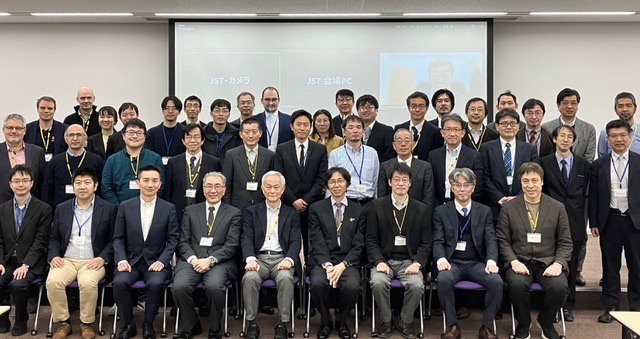News & Topics
ASPIRE Kick-off Meeting for the 2024 Selected Projects in the Field of Semiconductors and Telecommunications
Expectations for the Expansion of New Collaborative Research Activities Across Generations
Adopting Sustainable Partnerships for Innovative Research Ecosystem (ASPIRE)
On February 10, 2025, JST held a kick-off meeting of the Adopting Sustainable Partnerships for Innovative Research Ecosystem (ASPIRE) program. Researchers selected in the semiconductors and telecommunications fields under the ASPIRE for Top Scientists and ASPIRE for Rising Scientists categories gathered at the JST Tokyo headquarters. As the purpose of this event was to announce plans for each project and facilitate networking among researchers, a social gathering was held at the same venue after the meeting on Monday afternoon, during a sandwiched between holidays.
Approximately 60 people attended the meeting in person, and more than 40 participated online. Among the online participants, around 30 were from the general public who had applied via the website. Several researchers from partner countries also attended in person. The meeting fostered a lively exchange of opinions in a friendly atmosphere.
At the beginning, Dr. Atsutake Kosuge of The University of Tokyo, who was selected as a PI for ASPIRE for Rising Scientists in FY2023 and is currently conducting joint research with a PI from Stanford University in the United States, gave a presentation on his activities under the title “AI Processor Joint Research in Silicon Valley and Japan.” Subsequently, each project presented its plan. As researchers from different fields gathered, we avoided the use of technical terms and focused on the ASPIRE mission of promoting talent mobility through collaborative research. This approach worked well, and active interaction took place across fields, projects, and generations.
Participating researchers commented, “I was able to obtain useful information for international researcher networks and community participation,” “I found new collaborators,” and “I gained tips for young researchers to continue their research overseas without anxiety.” An advisor responded, “I would like to follow up on the implementation of the plan for each project.” On the flip side, there were concerns, unique to ASPIRE, regarding differences in rules on budget usage among institutions and difficulties in arranging international collaborative research agreements (CRAs). It was recognized that these issues were difficult to solve through the willingness and ingenuity of researchers alone and that they should be addressed in cooperation with their universities or institutions.
Through ASPIRE, JST will continue to support various activities to further expand the international reach of Japanese researchers in critical and emerging science and technology fields.

A group photo of the participants
